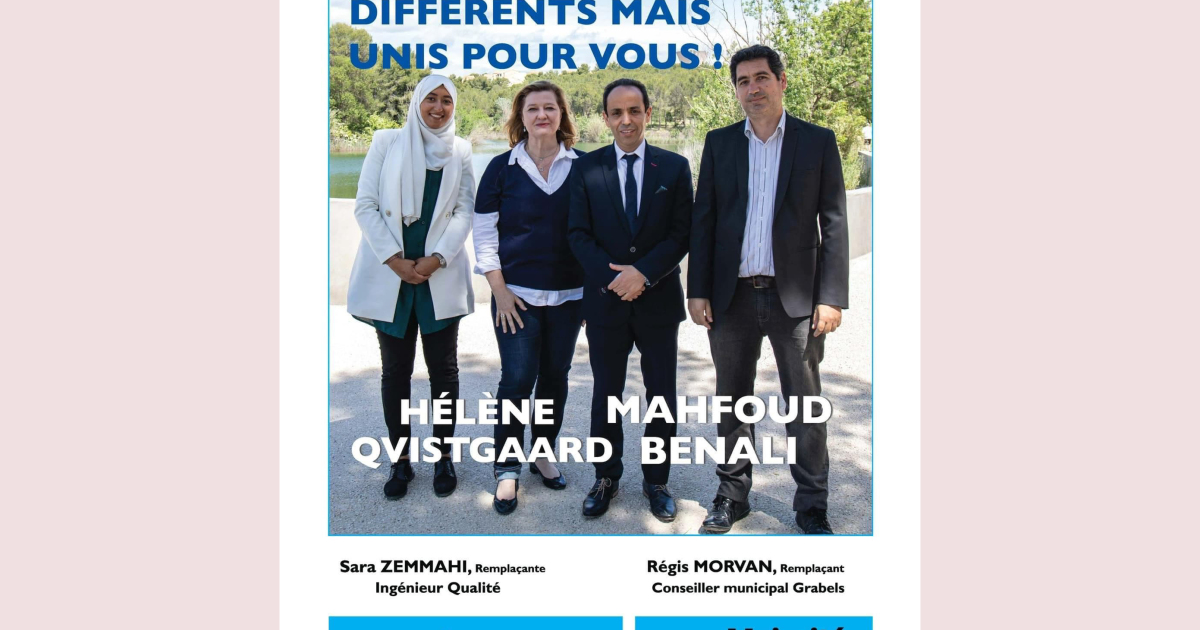
Sara Zemmahi was planning to run with LREM in local elections, but has been criticised by the far right and the LREM itself.
French President Emmanuel Macron’s ruling centrist party has barred a Muslim candidate from running in a local election after she was photographed in a hijab for a campaign flyer, a move which has drawn criticism from experts and opened bitter divisions within the party.
Macron’s La Republique en Marche (The Republic on the Move, LREM) said the party line was that in secular France, there should be no place for the overt display of religious symbols on electoral campaign documents.
“This woman will not be an en Marche candidate,” Stanislas Guerini, the party’s general secretary, told RTL radio, referring to Sara Zemmahi.
An LREM official close to Guerini said Zemmahi would be officially informed of the party’s decision in writing, according to Reuters news agency.
In the poster, Zemmahi is pictured wearing a white hijab, a headscarf worn by many Muslim women who feel it is part of their religion, standing alongside three other people.
The words “Different, but united for you” on the flyer appear to be a reference to diversity.
French law does not prohibit the wearing of the hijab or other religious symbols in images that appear on campaign fliers.
The affair over the campaign poster erupted after Jordan Bardella, number two in the far-right Rassemblement National party of Marine Le Pen, tweeted a copy of the flyer with the message: “Is this how you fight separatism?”
Guerini responded directly on Twitter, demanding either the flyer be withdrawn or the candidate Sara Zemmahi lose the party’s support.
“Undignified. Running after [far-right] votes will only allow their ideas to prevail. Enough is enough,” tweeted LREM lawmaker Caroline Janvier.
But another party legislator, Roland Lescure, told Reuters: “It’s an explosive subject. Political Islam is a reality, it is a simmering threat in some neighbourhoods and we have to be very firm.”
Rim-Sarah Alouane, a French researcher, legal scholar and PhD candidate at the University of Toulouse, told Al Jazeera: “This latest scandal is just another example of how the visibility of Islam is the real issue at stake for our political elite, from both sides of the political spectrum.
“France still refuses to accept the fact that, firstly, Islam is part of the French landscape and belongs to France, and secondly, French Muslims are part of the fabric of this country and are here to stay, and that includes participating in France’s civic life.”
She added: “Unfortunately in France, a good Muslim is an invisible Muslim. There is a political will to erase the visibility of Islam from the public square, and this goes against the spirit of the [secularism] law of 1905. Muslim women are the first group of people to pay such a high price.”
Macron’s push against ‘separatism’
Macron, who prided himself on the multicultural, ethnically diverse makeup of his nascent party after his 2017 election victory, has warned of the growing threat of “Islamist separatism” to France’s core values and the republic’s unity.
On October 2 last year, he announced several measures that would form a bill aimed at tackling “separatism”, such as improving the oversight of mosque financing, and scrutinising schools and associations serving religious communities.
But the bill, which has been debated in the lower house and senate but is yet to become law, has drawn criticism from rights groups and French Muslims who say the regulations will discriminate against the minority community.
Macron’s administration claims the laws are essential in fostering cohesion and curbing attacks, but some observers believe the president is pandering to the far right in a bid to win next year’s election, which will likely see him challenged by Le Pen in the second round – the same scenario he faced in 2017.
Referring to the poster of Zemmahi, Alouane said: “Who are the real separatists here? This Muslim woman running for a democratic election to defend a project she believes in, or those who are trying to undermine her efforts?
“Indeed, we often accuse Muslims of not being integrated and to separate themselves from the French society. But when a French Muslim woman wearing a headscarf, who is highly educated, empowered and wants to bring her contribution and participate to the democratic process, we start going after her, accusing her of proselytism or spreading so-called ‘political Islam’; and make sure to invisibilise her.”








